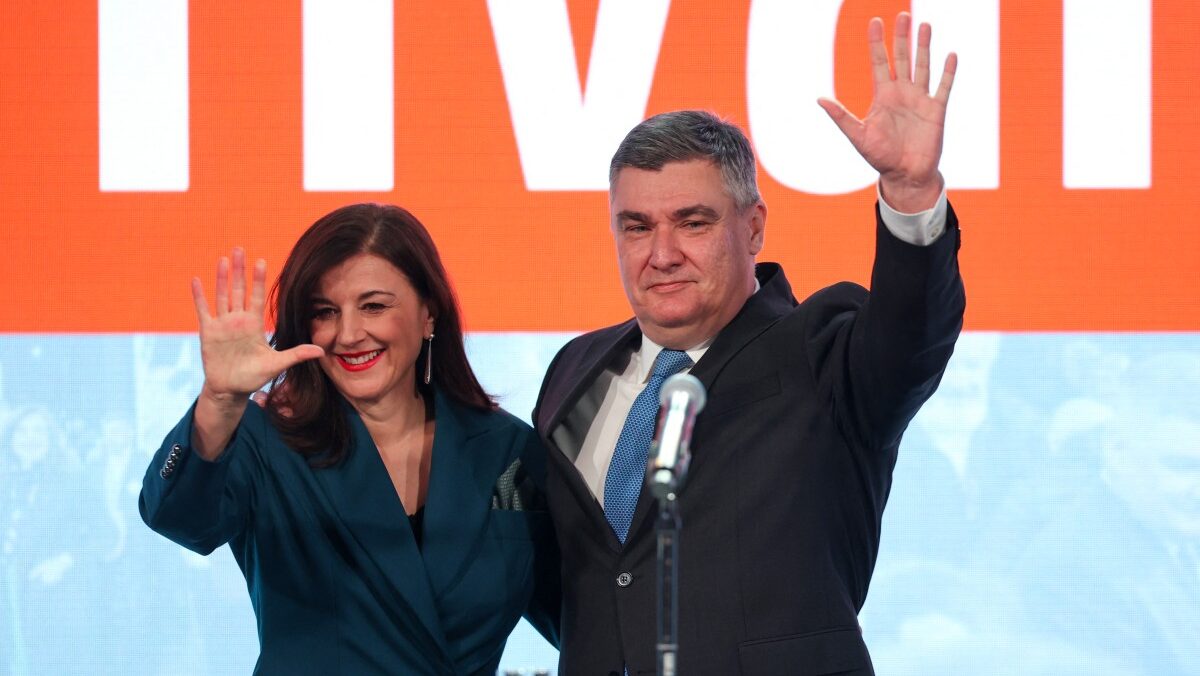
President Zoran Milanovic (R) and his wife Sanja Music Milanovic (L) waves to supporters after his speech at his headquarters, in Zagreb on January 12, 2025.
Photo: DAMIR SENCAR / AFP
Croatian President Zoran Milanović, a harsh critic of the European Union and an opponent of sending military aid to Ukraine, has been re-elected in a landslide victory.
Final results show that the 58-year-old social democrat received 74.7% of the votes in the second round of the election, held on Sunday, January 12th. His opponent, Dragan Primorac, an independent candidate backed by the ruling centre-right Croatian Democratic Union (HDZ) party, gained only 25.3%.
Though the presidential role is largely ceremonial, the election should be viewed as a reflection of the current mood in the EU and NATO member country.
The HDZ party—which has dominated Croatian politics since the country gained independence from Yugoslavia in 1991—won last year’s parliamentary elections with 34%, but has lost a lot of its support since then, and is currently polling at 27%.
Milanović is described as the most popular politician in Croatia. His critical tone toward the EU is in stark contrast with the HDZ, a Europhile party that’s a member of von der Leyen’s European People’s Party (EPP) and deeply embedded in the EU establishment.
Upon voting on Sunday, Milanović again criticised the EU as “in many ways anti-democratic” and run by unelected officials. The EU position that “if you don’t think the same as I do, then you’re the enemy” amounts to “mental violence,” Milanović said. “That’s not the modern Europe I want to live and work in. I will work on changing it, as much as I can as the president of a small nation.”
Journalist Goran Andrijanić told europeanconservative.com,
Prime Minister Andrej Plenković’s government is seen by many as espousing pro-Brussels, pro-progressive politics, leaving the cultural and political identity of Croats unprotected. His government adopted the euro without asking the people about it, and he accepted the Migration Pact and the green policies of the EU without criticism. Many people believe that we are more like the political and economic colony of the EU, not a sovereign country.
In the meantime, Milanović has upped his anti-establishment rhetoric with regard to criticising EU measures that are harmful to Croatia and challenging Brussels’ support for Ukraine’s war effort.
Last year, the president said he would not allow any Croatian military personnel to participate in the NATO Security Assistance and Training for Ukraine (NSATU) mission as it could have “harmful consequences on Croatia’s national interests.”
According to Goran Andrijanić, the president’s triumph could pave the way for his return to party politics, potentially positioning him to lead the Social Democrats (SDP) in the next election. He previously served as prime minister from 2011 to 2016.
The post-communist SDP is currently only 3.5 points behind the ruling HDZ party in the latest opinion polls.
